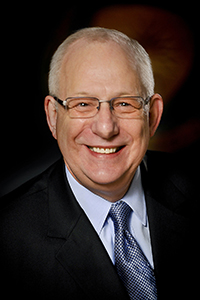Complaint Department: Who should you find when you need help?
While in college, students may change their majors, take classes that are not within their majors, raise money for worthy causes and make suggestions on future classes.
The President
To help any of these processes go smoothly, it’s important to know who’s who at your university. While you attend Kent State, get to know these people, because along the way, they’ll be very helpful in making your college career a successful one.
Kent State University’s president is Lester Lefton, who has been the university’s head for the past six years. The Kent State Board of Trustees elected Lefton in 2006. As president, Lefton’s duties include but are not limited to:
1) Serving as a figurehead for the university, often giving speeches and representing the university in a public setting.
2) Raising money for the university from donors and Kent State alumni.
3) Assisting the Board of Trustees in making major decisions for the university.
The Provost
The Kent State provost is Todd Diacon, who is serving his first full year as provost. As university provost, Diacon is basically involved in every aspect of the institution — from recommending department name changes to implementing programs to increase Kent State’s retention rate. Other provost duties may include consulting with the deans of various departments and supervising the university’s curricular and research affairs.
Deans and Directors
The deans head specific academic departments at the university. Deans hold significant authority as the heads of their designated units, often making important decisions for the department — and the schools and colleges that fall under that particular department — with the help of the different schools’ directors.
Directors head a specific school or college that falls under an academic department. Directors often assist in implementing new programs and classes for their schools.
Common student questions:
1. How do I change my major/minor?
Start by talking to your adviser. Your adviser will guide you through your college years and help you make the right decisions when it comes to your classes and internships.
Discuss with your adviser the reason you’re interested in changing your major or minor. Once the decision to change is final, your adviser will direct you to the section of FlashLine dedicated to undergraduate student change of program, which will eventually reach the director of your school and the dean of your college. Your major will be changed officially in the records.
2. If I’m having problems with a professor, who do I talk to about it?
Discuss the issue with your adviser, who may have some suggestions on how to approach the professor. Remember to always be respectful and handle the situation professionally.
If the problem continues, consider discussing it with the director of your school/program.
3. If I’m unhappy with a grade, how do I handle it and who do I talk to about it?
First consider whether the grade is actually worth the work you’ve done to complete the assignment. We all would prefer a better grade, but when thinking about it rationally, sometimes the grade is appropriate, whether we want it to be or not. If you really think you deserved a better score, approach your professor about it in a polite and professional manner, and keep in mind that you still may not get what you want. If the professor refuses to change the grade — which they have every right to do — and you still think you deserved a better grade, consult with the director, who will inform you on the process of filing an appeal.
Contact Ray Evans at [email protected].



